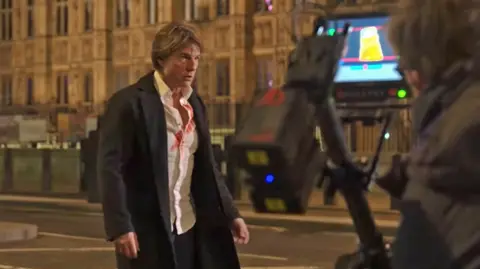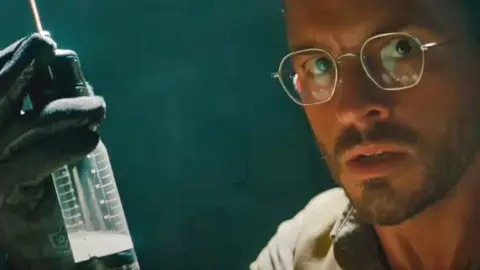Culture reporter
 Getty Images
Getty ImagesFilm tariffs will form part of trade negotiations between the UK and US after Donald Trump said he would apply a 100% charge against movies made in foreign countries.
Trump said in an announcement overnight that he would apply tariffs to foreign-made films to help America’s movie industry, which he said was dying “a very fast death”.
In response, the UK government said trade negotiations with Washington were ongoing and it was taking a “calm and steady approach” to talks in a bid to “ease pressure on UK businesses”.
It came as UK filmmakers warned freelancers in the industry risked being “jobless” if US productions were pulled, while one union saying the tariffs could be a “knock-out blow”.
The UK film sector is worth £1.36 billion and employs more than 195,000 people, the government said in October.
Much of the detail of the new tariff has yet to be confirmed.
White House spokesman Kush Desai said later on Monday: “Although no final decisions on foreign film tariffs have been made, the administration is exploring all options to deliver on President Trump’s directive to safeguard our country’s national and economic security while Making Hollywood Great Again.”
But there is worry that UK film companies, which often produce movies with US firms – including recent blockbusters like Barbie and Wicked – could be badly hit.
“If those US films don’t get partly produced or produced in the UK, freelancers are going to be jobless. I’m telling you now, they really are goig to be jobless,” Kirsty Bell, chief executive of UK production company Goldfinch, said.
Philippa Childs, head of media and entertainment trade union, Bectu, echoed those fears: “These tariffs, coming after Covid and the recent slowdown, could deal a knock-out blow to an industry that is only just recovering and will be really worrying news for tens of thousands of skilled freelancers who make films in the UK.”
A parliamentary committee’s report published last month noted the UK’s film and high-end television industry is “dominated” by inward investment from US studios and that this “brings significant economic and social benefits to the UK”.
Culture, Media and Sport (CMS) chairwoman Dame Caroline Dinenage said on Monday that MPs had warned “against complacency on our status as the Hollywood of Europe” when the report came out.
“President Trump’s announcement has made that warning all too real,” she said.
Dame Caroline argued that making it more difficult to produce films in the UK was not in the interests of American businesses, many of which have invested in UK facilities, such as sound stages and studios.
She urged ministers to “urgently prioritise this as part of the trade negotiations currently under way”.
It is still not entirely clear whether Trump’s plans will affect only British films exported to the US or if it will also have an impact on co-productions, as referenced by Bell and others. The uncertainty itself is worrying for many.
Speaking on BBC Radio 4’s Today programme on Monday, Tim Richards, CEO and founder of Vue Entertainment, said: “The devil will be in the details and we need to parcel through exactly what [Trump] means.
“A big part of this is what constitutes US film, is it where the money comes from, the script, the director, the talent, where it was shot?
“Hollywood… has been in decline for some time,” he said. “A lot of films are being shot in other states and in other markets, principally Canada, the UK and Australia.”
He added: “One of the reasons the UK has done so well is we have some of the most highly skilled and experienced filmmakers and production crews in the world.”
 Paramount Pictures
Paramount PicturesBell concurred that “the issue isn’t that foreign films are taking precedence over domestic films, it’s that, firstly, films are cheaper to make overseas, because of lack of tax credits in certain places” and lower costs.
“People aren’t going to the cinema as much and decline in subscription services and rise of social media platforms and content creators… the industry is entirely changed.”
She added: “The answer is not tariffs if [Trump is] trying to kick-start the industry in Hollywood.”
According to the Hollywood Reporter, the Californian film commission offers a 20 percent base credit to feature films and TV series – lower than most other US states and countries like the UK and has a $330m (£248m) cap on the programme, which can make countries like the UK more attractive.
A government spokesperson said on Monday: “The film sector is a key part of the UK’s world-class creative industries, which employ millions of people, generate billions for our economy and showcase the best of our creativity and culture to the world.
“We are absolutely committed to ensuring these sectors can continue to thrive and create good jobs right across the country, and will set this out through a new Creative Industries Sector Plan to be published soon.
“Talks on an economic deal between the US and the UK are ongoing – but we are not going to provide a running commentary on the details of live discussions or set any timelines because it is not in the national interest. We will continue to take a calm and steady approach to talks and aim to find a resolution to help ease the pressure on UK businesses and consumers.”
‘Hollywood’… in Borehamwood
 Universal Pictures
Universal PicturesDozens of Hollywood blockbusters in recent years have actually seen the majority of their filming – known as principal photography – in the UK, including:
- Wicked: Part I (2024) and Part II (2025)
- Jurassic World Rebirth (2025)
- Mission: Impossible – The Final Reckoning (2025)
- Snow White (2025)
- Indiana Jones and the Dial of Destiny (2023)
- Back in Action (2025)
- Mickey 17 (2025)
- Beetlejuice Beetlejuice (2024)
- A Quiet Place: Day One (2024)
- Sonic the Hedgehog 3 (2024)
- Aquaman and the Lost Kingdom (2023)
- Barbie (2023)
Source link
